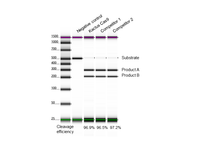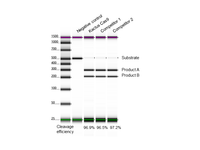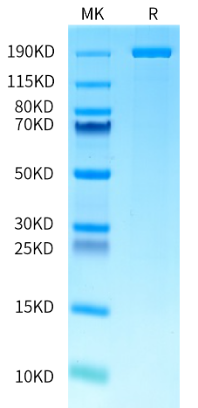Panorama of CRISPR Gene Editing Clinical Applications: 2024 Review
By Mallory Griffin
The approval of Casgevy in the UK in December 2023, the first CRISPR gene editing drug, marked the era of CRISPR therapy. In this article, we review the latest progress of CRISPR therapy in different diseases during the past year and discuss the changes in clinical applications of CRISPR therapy, as well as the essential role of high-quality gene editing enzymes in advancing these breakthroughs.
Blood Diseases
Sickle cell disease (SCD) and transfusion-dependent β-thalassemia (TBT) are the primary indications of CRISPR therapy. The first drug, Casgevy, edits genes in patients' HSCs by using a mixture of gRNA and Cas9 RNP in vitro, inducing the expression of fetal hemoglobin to compensate for the lack of adult hemoglobin function in patients, and eventually achieving a functional cure. During the past year, Casgevy has been approved in the UK, US, EU, Bahrain, Saudi Arabia, and Canada. According to Vertex's Q3 2024 financial report, 40 people have currently entered the treatment process (1). To ensure the accessibility of this therapy, Vertex has signed long-term commercial supply agreements for Casgevy with three companies: Lonza, Charles River, and RoslinCT (2).
Vertex calls Casgevy a "potential multi-billion dollar opportunity." However, priced at approximately $2.2 million per patient, this high cost significantly limits patient access. It is reported that in 2025, Casgevy will enter the new US CGT therapy access model, which plans to initiate pricing negotiations and link payment to efficacy, in order to reduce drug costs, alleviate the burden on medical insurance, and benefit more patients (3).
Other Clinical Trials for SCD and TDT
Beam Therapeutics announced its Phase I/II clinical data for its drug Beam-101, developed based on the new generation of CRISPR technology—Base Editing—at the American Society of Hematology (ASH) conference. The data showed good efficacy and durability. Since base editing technology only changes a single base and does not produce DNA double-strand breaks, it is theoretically safer than CRISPR/Cas9 technology.
Editas Medicine developed reni-cel, which was undergoing a Phase I/II clinical trial for SCD and TDT. It works similarly to Casgevy, but uses the Cas12a protein for gene editing. Clinical data reported at the 2024 ASH conference showed lasting efficacy and good safety (4). However, Editas Medicine announced its shift of focus to in vivo therapies, leading to the termination of this clinical trial.
Currently, all therapies for SCD and TDT are ex vivo therapies, putting very high demands on the CMC. Both CRISPR Therapeutics and Beam Therapeutics are also attempting to deliver gene editing components into the patient's body to achieve in vivo gene editing, in order to reduce the difficulty of drug manufacturing and quality control
Cancer
The currently approved chimeric antigen receptor T-cell (CAR-T) therapies have demonstrated remarkable efficacy against cancer. The majority of the current CAR-T therapies are autologous CAR-T, meaning that patients’ own cells are extracted and engineered externally, before transfusing back to patients. Leveraging gene editing tools such as CRISPR, researchers are now actively engineering CAR-T cells, aiming to develop allogeneic CAR-T therapies and/or enhance the persistence of autologous CAR-T. Although there are concerns about the lower efficacy of allogeneic CAR-T compared to autologous CAR-T, its lower production costs and better scalability still inspire the industry to seek to optimize and develop these therapies. For certain immuno-oncology workflows, especially those involving membrane-bound, low immunogenicity, or difficult-to-express targets, Custom VLP services can provide functionally relevant antigen presentation in screening and validation platforms.
Leukemia and Lymphoma
At the 2024 ASH conference, Beam Therapeutics reported Phase I/II data on the safety and efficacy of Beam-201, an anti-CD7 CAR-T therapy for T-cell leukemia and lymphoma. Beam-201 leverages base editing technology to simultaneously knock out CD7, TRAC, CD52, and PDCD1 on the surface of T cells. This aims to improve the allogeneic potential of CAR-T, reduce the risk of graft-versus-host diseases (GvHD) and host-versus-graft diseases (HvGD), avoid self-attack, and reduce the risk of immunosuppression (5).
Solid Tumors
Base Therapeutics’ gene-edited NK510 therapy, developed using single-base editing technology, received FDA IND clearance in 2024 for the treatment of advanced solid tumors. In this therapy, NK cells are edited ex vivo using the protein form of Base Therapeutics’ proprietary cytosine base editor, Accubase®. This further enhances NK510's capability to more accurately assess activating and inhibitory signals in the tumor microenvironment, which achieves the dual effect of both overcoming cancer cells' immune escape and specifically recognizing and killing cancer cells (6).
Figure 1. The application of CRISPR in immuno‑oncology. Source: Chehelgerdi et al. Molecular Cancer (2024) 23:9
Hereditary Diseases
Hereditary transthyretin amyloidosis (hATTR) is a progressive disease caused by missense mutations in the TTR gene. The missense mutations lead to structural changes in the TTR protein, causing it to misfold and form insoluble protein aggregates. These aggregates accumulate in tissues and organs, forming amyloid deposits. Over time, they damage and dysfunction organs such as the nerves, heart, and eyes.
Intellia Therapeutics, in collaboration with Regeneron, is developing NTLA-2001, an in vivo CRISPR-based gene therapy. It utilizes lipid nanoparticles (LNPs) to deliver CRISPR Cas9 mRNA and sgRNA, aiming to knock out the TTR gene in liver cells. This prevents the production of transthyretin (TTR) protein and is being developed for the treatment of hereditary transthyretin amyloidosis (hATTR) (7). This therapy has entered global Phase III clinical trials to assess the efficacy and safety of NTLA-2001 in patients with ATTR amyloidosis with cardiomyopathy. It is currently actively recruiting patients at over 35 clinical centers in 12 countries.
Figure 2. The mechanism of NTLA-2001 in vivo CRISPR therapy. Source: N Engl J Med 2021; 385:493-502
Metabolic Diseases
The high level of low-density lipoprotein cholesterol in the blood is the major risk factor inducing cardiovascular disease. Mutations in the PCSK9 gene can cause familial hypercholesterolemia.
VERVE-102, a novel single-base editing therapy developed by Verve Therapeutics, can permanently turn off the PCSK9 gene in the liver after a single treatment, which can durably reduce the level of low-density lipoprotein cholesterol (LDL-C) in blood. VERVE-102 is currently in Phase 1b clinical trials, targeting adult patients with heterozygous familial hypercholesterolemia (HeFH) and adult patients with premature coronary artery disease (CAD), respectively. Verve Therapeutics expects to provide initial data from the Heart-2 clinical trial and updates on the PCSK9 program in the first half of 2025 and plans to initiate Phase 2 clinical trials for the PCSK9 program in the second half of 2025 (8).
Inflammatory Diseases
Hereditary angioedema (HAE) is a rare genetic disease affecting approximately 1 in 50,000 people. It is characterized by severe, recurrent, and unpredictable inflammatory attacks in various organs and tissues throughout the body. Treatment is usually lifelong, requiring chronic intravenous or subcutaneous administration twice weekly, or daily oral administration. However, breakthrough attacks can still occur even with long-term medication. Inhibiting kallikrein is a clinically proven strategy for preventing hereditary angioedema (HAE).
Intellia has developed NTLA-2002, a one-time therapy that can achieve a functional cure. It works by using LNPs to deliver CRISPR-Cas9 gene editing components that target the KLKB1 gene in liver cells. This inhibits the production of kallikrein, which in turn inhibits the production of bradykinin, the overproduction of which is responsible for triggering attacks in hereditary angioedema (HAE). According to an Intellia report from October 2024, this therapy has completed Phase II clinical trials and is about to begin Phase III clinical trials (9).
HIV/AIDS
EBT-101, developed by Excision Biotherapeutics, utilizes an AAV vector to deliver CRISPR editing components, creating a functional cure strategy for HIV infection. This project employs CRISPR-Cas9 and two gRNAs, targeting three sites within the HIV genome. This allows for the excision of a large portion of the HIV genome, minimizing the potential for viral escape. EBT-101 has received Fast Track designation from the FDA.
Diabetes
Patients with type 1 diabetes who undergo traditional islet cell transplantation must continuously take anti-rejection drugs. Stem cell-derived islet cells are genetically edited and then transplanted into patients, providing them with healthy, new islet cells to help control or even cure T1-D without the need for immunosuppressants. Compared with conventional donor matching or autologous transplantation, universal and scalable stem cell-derived cell therapy is of great advantage for patients.
ViaCyte, in collaboration with CRISPR Therapeutics, developed a gene-edited stem cell therapy (VCTX210) for the treatment of type 1 diabetes. VCTX210 utilizes CRISPR-Cas9 to deplete the B2M, PD-L1, and HLA-E genes, preventing immune rejection after cell transplantation. In 2022, ViaCyte was acquired by Vertex Pharmaceuticals, and this clinical trial was put on hold.
Autoimmune Diseases
Autoimmune diseases occur when the immune system mistakenly identifies and attacks healthy cells and tissues. One example is systemic lupus erythematosus (SLE). Traditional autologous CAR-T therapy has been shown to alleviate SLE symptoms. CAR-T cells can be used to rapidly deplete and eliminate autoantibody-producing B cells, interrupting the excessive immune response, thereby reducing disease symptoms and resetting the patient's immune system. Compared to treatments targeting tumors, CAR-T cells for autoimmune diseases may not need to persist in the body for a long time. Currently, almost all CAR-T companies are establishing autoimmune disease divisions.
In 2024, the groundbreaking research on using CAR-T to treat autoimmune diseases was a runner-up for Science's 2024 Breakthrough of the Year (10). A study on the treatment of severe myositis and systemic sclerosis with a universal CD19-CAR-T therapy was highly recognized (11). This therapy, developed by BRL medicine, uses non-viral site-specific integration CRISPR gene editing technology to develop a universal CD19 CAR-T drug.
KACTUS Gene Editing Enzyme Products
The emergence of more novel CRISPR tools offers the possibility of treating previously intractable diseases, such as the use of new editing tools to rewrite faulty genes in hereditary diseases.
Currently, KACTUS has launched a variety of CRISPR gene editing tool enzymes, including GMP-grade Cas9 and GMP-grade base editor AccuBase®. Our GMP-grade Cas9 has completed FDA DMF filing, providing strong support for multiple projects to obtain IND approvals and conduct Phase I/II clinical trials
Browse Gene Editing Enzyme Products:
CRISPR Cas9 Protein, GMP-Grade
CRISPR Cas9 Protein, Research-Grade
AccuBase® Cytosine Base Editor, GMP-Grade
AccuBase® Cytosine Base Editor, Research-Grade
References
-
Biden-Harris Administration Announces Action to Increase Access to Sickle Cell Disease Treatments
-
CRISPR-Cas9 In Vivo Gene Editing for Transthyretin Amyloidosis. N Engl J Med 2021;385:493-502
-
Verve Therapeutics Announces Pipeline Progress and Reports Second Quarter 2024 Financial Results.
-
Results from Phase 2 Study of NTLA-2002 for Hereditary Angioedema
-
2024 Breakthrough of the Year-Science












